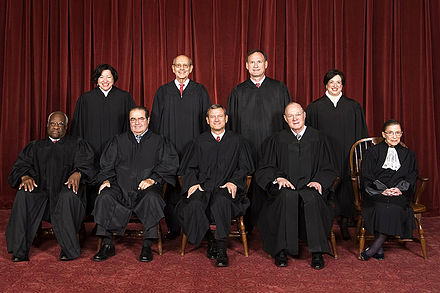The Los Angeles judge erred during the December 2006 voir dire in the
sex-crime trial of Bryant Keith Williams, according to the San
Francisco-based 9th U.S. Circuit Court of Appeals.
The judge said
Williams had pleaded guilty to the charges, though he intended to say
Williams had pleaded not guilty.
Article here. (via above the law blog).
Thursday, October 30, 2014
Tuesday, October 28, 2014
Former Zeeland attorney spent almost all $900,000 of missing client funds
Of the $900,000 that former Zeeland attorney Kenneth Hoesch took
from clients’ estate trusts, only a relative pittance has been found.
He had $2,065.57 in a client trust account at Macatawa Bank and had a coin collection, appraised at $3,388, in a safety-deposit box at Huntington Bank in Zeeland.
Article here. (via mlive.com)
He had $2,065.57 in a client trust account at Macatawa Bank and had a coin collection, appraised at $3,388, in a safety-deposit box at Huntington Bank in Zeeland.
Article here. (via mlive.com)
Monday, October 27, 2014
Did you ever wonder why lawyers are so expensive? ?
Lawyers are expensive because you get a lot for your money. You get someone who will abandon their precious supercar — or regular car — in rising flood waters so he can attend your hearing. You get someone who will lose sleep worrying about your legal problem so you can finally get some rest.
Article here (via the Lawyerist).
Or, as my Civil Procedure professor put it: Lawyers are like garbage men: we take your problems, put them away for you, so you don't have to do it yourself. He liked to use graphics and props in class, so sometimes he had a toaster, stuffed animal, garbage bag (or maybe I am misremembering that part, it was 9am on a Sunday when I took that class), or other thing to demonstrate what he was explaining. I didn't score very high in that class but I do remember a lot of it quite well, thanks to his graphics and explanations.
Number of people taking LSAT drops further
The number of people taking the Law School Admission Test dropped 8.1
percent for the test this fall, compared to the fall test last year,
after declining 9.2 percent for the June test.
Those latest figures from the Law School Admission Council indicate a downward trend over the last five years, report TaxProf Blog and the Excess of Democracy Blog. The total number of LSATs administered in June and September/October is 52,745, a drop of 40 percent from the totals for the same test period in 2009.
Article here. (ABA Journal).
Those latest figures from the Law School Admission Council indicate a downward trend over the last five years, report TaxProf Blog and the Excess of Democracy Blog. The total number of LSATs administered in June and September/October is 52,745, a drop of 40 percent from the totals for the same test period in 2009.
Article here. (ABA Journal).
Wednesday, October 22, 2014
Want to go to law school for less? Get into Wayne State Law School.
Wayne State University Law School is battling a drop in enrollment
with a tuition freeze and guaranteed scholarships for every incoming
student.
The Detroit law school says in a press release that tuition will be frozen at about $28,000 for all incoming and current students through at least the 2015-16 school year. In addition, the school is guaranteeing scholarships of at least $4,000 annually to all incoming students and offering nearly $1 million in new scholarship opportunities to current students. TaxProf Blog noted coverage in the Detroit Free Press.
Article here (via abajournal).
The Detroit law school says in a press release that tuition will be frozen at about $28,000 for all incoming and current students through at least the 2015-16 school year. In addition, the school is guaranteeing scholarships of at least $4,000 annually to all incoming students and offering nearly $1 million in new scholarship opportunities to current students. TaxProf Blog noted coverage in the Detroit Free Press.
Article here (via abajournal).
Monday, October 20, 2014
Mom's facebook message to Dad not sufficient notice about adoption, court rules
A pregnant unwed mother can’t use Facebook alone to notify the father about the baby before putting the child up for adoption, Oklahoma’s highest civil court has ruled.
The case was the latest to test the legal weight of communication through Facebook and other social media. Previously, for instance, courts have debated whether a plaintiff in a lawsuit could use Facebook to serve legal papers — such as summonses or hearing notices — on a defendant.
Article here. (via Wall Street Journal law blog).
The case was the latest to test the legal weight of communication through Facebook and other social media. Previously, for instance, courts have debated whether a plaintiff in a lawsuit could use Facebook to serve legal papers — such as summonses or hearing notices — on a defendant.
Article here. (via Wall Street Journal law blog).
Friday, October 17, 2014
Requiring sex offenders to disclose online screen names isn't a Free Speech violation, says court.
A Pennsylvania law requiring convicted sex offenders to reveal their Internet aliases does not violate the First Amendment, according to an en banc panel of Pennsylvania’s intermediate-level Commonwealth Court.
The sex offender, Richard Coppolino, had alleged the law violated his right to anonymous online speech, report the Legal Intelligencer and the Allentown Morning Call. He alleged the reporting requirement was overbroad because it was intended to protect minors, but his crime did not involve a minor or the Internet.
Article here (via ABA journal).
The sex offender, Richard Coppolino, had alleged the law violated his right to anonymous online speech, report the Legal Intelligencer and the Allentown Morning Call. He alleged the reporting requirement was overbroad because it was intended to protect minors, but his crime did not involve a minor or the Internet.
Article here (via ABA journal).
Wednesday, October 15, 2014
Incapacitated individuals and family law: who can file for divorce?
Q: Can a guardian or conservator file for divorce on behalf of an incapacitated individual?
A: Yes.The Michigan Court of Appeals has recently ruled on this issue. See In Re: Burnett Estate,
834 NW 2d 93 - Mich: Court of Appeals 2013.
If an individual becomes incapacitated, it's likely that he or she will then have a person acting for him or her. It could be a conservator -- who's in control of his or her finances, or a guardian -- who's in control of his or her personal decisions (like where to live, what doctors to see, etc.).
That guardian or conservator -- whether appointed by a court or selected through another method-- is allowed under Michigan law to file suit, and be sued on the incapacitated individual's behalf. (See Michigan Court Rules 3.202 (A) and 2.201 (E)). Under the Burnett case, that includes a suit for divorce (and, presumably custody).
In the Burnett case, a divorce was filed by the conservators of the Plaintiff. The Defendant later motioned the court for summary judgment, asking for the circuit court judge to dismiss the action, based on the case being filed by a conservator.
The circuit court dismissed the summary judgment motion, saying a conservator does have authority to file on behalf of an incapacitated individual. Other issues existed in the case. But once the case was decided, the Defendant appealed on multiple grounds, including the grounds that the conservator should not have been allowed to file, and that the circuit court should have granted the summary judgment motion.
The Court of Appeals disagreed with this ground of Defendant's appeal, and interpreted the Court Rules to allow for a divorce to be filed by a conservator or guardian.
"Had the legislature intended to prohibit an action by a guardian on behalf of a spouse, it could have expressly said so in the language of [the statute]." Burnett, at 97.
The circuit court dismissed the summary judgment motion, saying a conservator does have authority to file on behalf of an incapacitated individual. Other issues existed in the case. But once the case was decided, the Defendant appealed on multiple grounds, including the grounds that the conservator should not have been allowed to file, and that the circuit court should have granted the summary judgment motion.
The Court of Appeals disagreed with this ground of Defendant's appeal, and interpreted the Court Rules to allow for a divorce to be filed by a conservator or guardian.
"Had the legislature intended to prohibit an action by a guardian on behalf of a spouse, it could have expressly said so in the language of [the statute]." Burnett, at 97.
Have more questions about family law or estate planning (or the inter-twining of the two)? Ask me! Post your comments or questions on this blog.
Tuesday, October 14, 2014
Prison sentence for man who assaulted his girlfriend for not wanting him to go to strip clubs
A Traverse City man was sentenced to nearly five years in prison for
trying to strangle his girlfriend who, according to investigators, did
not like him going to strip clubs.
Article here.
Article here.
Dissent makes strange companions: Ginsberg, Scalia and Thomas join in dissent
"Cert" or certiorari, is the process whereby the US Supreme Court decides whether to hear a case. A party -- who has already had a ruling from a "lower" court -- has to petition the US Supreme to hear the case. This is called a "petition for certiorari." When the justices review a case, but decide not to hear any oral argument, they deny its certiorari (which leads to its being "cert denied").
Justices can, but most often do not, write a dissent against cert being denied. Why? Because the justices would be writing them all the time. The vast majority of cases that are appealed to the US Supremes are denied.
So it's unusual for justices to write a dissent about denial of a cert petition. And it's more rare still when justices Ginsberg, Scalia, and Thomas, who usually have such otherwise- opposing view points, join in that dissent.
Article here.
Justices can, but most often do not, write a dissent against cert being denied. Why? Because the justices would be writing them all the time. The vast majority of cases that are appealed to the US Supremes are denied.
So it's unusual for justices to write a dissent about denial of a cert petition. And it's more rare still when justices Ginsberg, Scalia, and Thomas, who usually have such otherwise- opposing view points, join in that dissent.
Article here.
Justice Antonin Scalia wrote the dissent (PDF), joined by Justices Clarence Thomas and Ruth Bader Ginsburg. “The present petition presents the nonhypothetical case the court claimed to have been waiting for,” Scalia wrote.
Jurors had convicted three drug defendants in the case for distributing small amounts of crack cocaine, but acquitted the defendants of conspiring to distribute drugs. The sentencing judge nonetheless found that the defendants had engaged in the conspiracy and, relying largely on that finding, calculated guidelines ranges that were much higher than for distribution convictions.
“Petitioners present a strong case that, but for the judge’s finding of fact, their sentences would have been ‘substantively unreasonable’ and therefore illegal,” Scalia wrote. “If so, their constitutional rights were violated.
Thursday, October 9, 2014
Justice in Stapleton case, according to Autism Advocates
Kelli Stapleton, a mom in Northern Michigan, attempted to kill her autistic daughter and herself in 2013, and was charged with first-degree child abuse.
Stapleton was sentenced earlier yesterday, and received the maximum penalty under Michigan's sentencing guidelines for the crime.
The Autism Self Advocacy Network (ASAN) celebrates the success of the justice system in a press release today.
Article here (via mlive).
Stapleton was sentenced earlier yesterday, and received the maximum penalty under Michigan's sentencing guidelines for the crime.
The Autism Self Advocacy Network (ASAN) celebrates the success of the justice system in a press release today.
Article here (via mlive).
By imposing a similar sentence as would be expected for someone who committed the same crime against a non-disabled child, the court has sent the message that Issy’s life was as valued as any other.
Tuesday, October 7, 2014
Lawyers: When should you decide not to take a case?
Getting more work is part of the work when you're a solo attorney. As if it's not enough to just do a good job on the work you do get, you won't get new work unless you are actively looking for it. And everyone says they want more cases, but what they really want is more good cases.
This article is a short list (from The Lawyerist) of how to evaluate when a case is good (worth taking) or not.
This article is a short list (from The Lawyerist) of how to evaluate when a case is good (worth taking) or not.
When evaluating clients, I have a list of red flags that generally mean I will not take the case. Like most lawyers, I have talked to potential clients and declined to represent them without hearing much about their potential case. If there is something about a client that does not fit my standard profile at the intake stage, it will become a bigger problem as the case develops.
Monday, October 6, 2014
How is an estate handled when a couple dies at the same time?
Q: What happens to estates when a married couple dies at the same time?
A: It depends.
Most states, including Michigan, have adopted some form of the Uniform Simultaneous Death Act. (Michigan's version is in the Estates and Protected Individuals Code, aka EPIC, since Michigan loves to give acronyms to the things it writes in legislative code.)
More information here (Wikipedia article) and here (Michigan legislative service).
For example, John and Mary are a retired couple who take a bus trip, and die an untimely death en route to their destination. Who will inherit the estate of Mary, Mary's family? or John's? What if John dies on the bus, but Mary lives in the hospital, and dies from complications one day later? Because if Mary died first, her estate would become John's, who then has the larger estate, (see the problem?) And: would an heir then "take" twice, once from the first to die, and a second time from the second to die?
The law, in the form of the Simultaneous Death Act, takes care of both problems. It determines for all those wondering who died first that they both died first. In this way, both sides of the family will take from their decedent's estate only one time.
Have other questions about how Michigan law treats your property when you die? Ask me! One of my specialty areas of law is estate planning, which includes wills and trusts.
A: It depends.
Most states, including Michigan, have adopted some form of the Uniform Simultaneous Death Act. (Michigan's version is in the Estates and Protected Individuals Code, aka EPIC, since Michigan loves to give acronyms to the things it writes in legislative code.)
The Uniform Simultaneous Death Act is a uniform act enacted in some U.S. states to alleviate the problem of simultaneous death in determining inheritance.
The Act specifies that, if two or more people die within 120 hours of one another, and no will or other document provides for this situation explicitly, each is considered to have predeceased the others.
More information here (Wikipedia article) and here (Michigan legislative service).
For example, John and Mary are a retired couple who take a bus trip, and die an untimely death en route to their destination. Who will inherit the estate of Mary, Mary's family? or John's? What if John dies on the bus, but Mary lives in the hospital, and dies from complications one day later? Because if Mary died first, her estate would become John's, who then has the larger estate, (see the problem?) And: would an heir then "take" twice, once from the first to die, and a second time from the second to die?
The law, in the form of the Simultaneous Death Act, takes care of both problems. It determines for all those wondering who died first that they both died first. In this way, both sides of the family will take from their decedent's estate only one time.
Have other questions about how Michigan law treats your property when you die? Ask me! One of my specialty areas of law is estate planning, which includes wills and trusts.
Thursday, October 2, 2014
When should a judge recuse herself? Justice Ginsberg puts her role in debate.
Recusal is when a judge "sits out" on a case that she would otherwise have heard. It can happen voluntarily - she decides that her interest in a case client would injure her impartiality, or involuntarily -- when an attorney for a party motions the court to recuse. It's part of due process, which means that a case should be heard by a fair an impartial judge.
Comments made by Justice Ruth Bader Ginsburg in a magazine interview have reignited a long-simmering ethical debate confronting the Supreme Court over when a justice ought to sit out a case.
In a New Republic interview published Sunday, Justice Ruth Bader Ginsburg was asked by legal scholar Jeffrey Rosen if state lawmakers could be trusted to safeguard abortion rights.
Article here. (via WSJ lawblog).
Comments made by Justice Ruth Bader Ginsburg in a magazine interview have reignited a long-simmering ethical debate confronting the Supreme Court over when a justice ought to sit out a case.
In a New Republic interview published Sunday, Justice Ruth Bader Ginsburg was asked by legal scholar Jeffrey Rosen if state lawmakers could be trusted to safeguard abortion rights.
Article here. (via WSJ lawblog).
The upcoming US Supreme Court sessions: What to expect
The Supreme Court on Thursday agreed to hear a pair of high-stakes discrimination cases that examine religious accommodations for job applicants and the scope of federal fair-housing law.
The cases were among a new batch of appeals the justices added to their docket for the court’s upcoming 2014-2015 term, which begins on Monday.
Article here (via wsj law blog).
The cases were among a new batch of appeals the justices added to their docket for the court’s upcoming 2014-2015 term, which begins on Monday.
Article here (via wsj law blog).
Subscribe to:
Posts (Atom)












